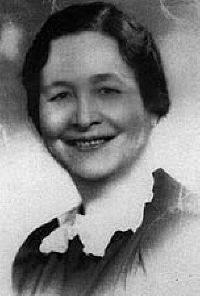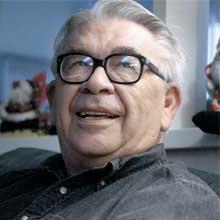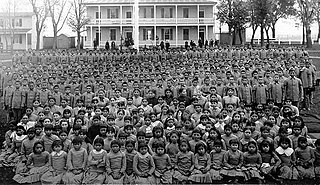Related Research Articles

The Indian Reorganization Act (IRA) of June 18, 1934, or the Wheeler–Howard Act, was U.S. federal legislation that dealt with the status of American Indians in the United States. It was the centerpiece of what has been often called the "Indian New Deal". The major goal was to reverse the traditional goal of cultural assimilation of Native Americans into American society and to strengthen, encourage and perpetuate the tribes and their historic Native American cultures in the United States.
Worcester v. Georgia, 31 U.S. 515 (1832), was a landmark case in which the United States Supreme Court vacated the conviction of Samuel Worcester and held that the Georgia criminal statute that prohibited non-Native Americans from being present on Native American lands without a license from the state was unconstitutional. The opinion is most famous for its dicta, which laid out the relationship between tribes and the state and federal governments. It is considered to have built the foundations of the doctrine of tribal sovereignty in the United States.

Tribal sovereignty in the United States is the concept of the inherent authority of indigenous tribes to govern themselves within the borders of the United States.

Indian country is any of the many self-governing Native American/American Indian communities throughout the United States. As a legal category, it includes "all land within the limits of any Indian reservation", "all dependent Indian communities within the borders of the United States", and "all Indian allotments, the Indian titles to which have not been extinguished."

An Indian reservation is an area of land held and governed by a U.S. federal government-recognized Native American tribal nation, whose government is semi-sovereign, subject to regulations passed by the United States Congress and administered by the United States Bureau of Indian Affairs, and not to the U.S. state government in which it is located. Some of the country's 574 federally recognized tribes govern more than one of the 326 Indian reservations in the United States, while some share reservations, and others have no reservation at all. Historical piecemeal land allocations under the Dawes Act facilitated sales to non–Native Americans, resulting in some reservations becoming severely fragmented, with pieces of tribal and privately held land being treated as separate enclaves. This jumble of private and public real estate creates significant administrative, political, and legal difficulties.

Ella Cara Deloria, also called Aŋpétu Wašté Wiŋ, was a Yankton Dakota (Sioux) educator, anthropologist, ethnographer, linguist, and novelist. She recorded Native American oral history and contributed to the study of Native American languages. According to Cotera (2008), Deloria was "a pre-eminent expert on Dakota/Lakota/Nakota cultural religious, and linguistic practices." In the 1940s, Deloria wrote a novel titled Waterlily, which was published in 1988, and republished in 2009.

Vine Victor Deloria Jr. was an author, theologian, historian, and activist for Native American rights. He was widely known for his book Custer Died for Your Sins: An Indian Manifesto (1969), which helped attract national attention to Native American issues in the same year as the Alcatraz-Red Power Movement. From 1964 to 1967, he served as executive director of the National Congress of American Indians, increasing its membership of tribes from 19 to 156. Beginning in 1977, he was a board member of the National Museum of the American Indian, which now has buildings in both New York City and in Washington, DC, on the Mall.
Native American studies is an interdisciplinary academic field that examines the history, culture, politics, issues, spirituality, sociology and contemporary experience of Native peoples in North America, or, taking a hemispheric approach, the Americas. Increasingly, debate has focused on the differences rather than the similarities between other Ethnic studies disciplines such as African American studies, Asian American Studies, and Latino/a Studies.
Johnson v. McIntosh, 21 U.S. 543 (1823), also written M‘Intosh, is a landmark decision of the U.S. Supreme Court that held that private citizens could not purchase lands from Native Americans. As the facts were recited by Chief Justice John Marshall, the successor in interest to a private purchase from the Piankeshaw attempted to maintain an action of ejectment against the holder of a federal land patent.

Suzan Shown Harjo is an advocate for Native American rights. She is a poet, writer, lecturer, curator, and policy advocate who has helped Native peoples recover more than one million acres (4,000 km²) of tribal lands. After co-producing the first American Indian news show in the nation for WBAI radio while living in New York City, and producing other shows and theater, in 1974 she moved to Washington, D.C., to work on national policy issues. She served as Congressional liaison for Indian affairs in the President Jimmy Carter administration and later as president of the National Council of American Indians.

A series of efforts were made by the United States to assimilate Native Americans into mainstream European–American culture between the years of 1790 and 1920. George Washington and Henry Knox were first to propose, in the American context, the cultural assimilation of Native Americans. They formulated a policy to encourage the so-called "civilizing process". With increased waves of immigration from Europe, there was growing public support for education to encourage a standard set of cultural values and practices to be held in common by the majority of citizens. Education was viewed as the primary method in the acculturation process for minorities.
Elk v. Wilkins, 112 U.S. 94 (1884), was a United States Supreme Court landmark 1884 decision respecting the citizenship status of Indians.
United States v. Nice, 241 U.S. 591 (1916), is a United States Supreme Court decision which declared that Congress still retains plenary power to protect Native American interests when Native Americans are granted citizenship. United States v. Nice overruled the Heff decision which declared that Native Americans granted citizenship by the Dawes Act were also then citizens of the state in which they resided, meaning the sale of alcohol to such Native Americans was not subject to Congress's authority.
Ex parte Crow Dog, 109 U.S. 556 (1883), is a landmark decision of the Supreme Court of the United States that followed the death of one member of a Native American tribe at the hands of another on reservation land. Crow Dog was a member of the Brulé band of the Lakota Sioux. On August 5, 1881 he shot and killed Spotted Tail, a Lakota chief; there are different accounts of the background to the killing. The tribal council dealt with the incident according to Sioux tradition, and Crow Dog paid restitution to the dead man's family. However, the U.S. authorities then prosecuted Crow Dog for murder in a federal court. He was found guilty and sentenced to hang.

The Great Sioux Nation: Sitting in Judgment on America is a book edited by Roxanne Dunbar-Ortiz, "An Oral History of the Sioux Nation and Its Struggle for Sovereignty", that documents the 1974 "Lincoln Treaty Hearing". Testimony produced during that hearing has been cited by the International Indian Treaty Council in advocating for Indigenous sovereignty and treaty rights, efforts which eventually saw the 2007 Declaration on the Rights of Indigenous Peoples.
Jacqueline Keeler is a Native American writer and activist, enrolled in the Navajo Nation and of Yankton Dakota descent, who co-founded Eradicating Offensive Native Mascotry (EONM), which seeks to end the use of Native American racial groups as mascots.

Native Hawaiians are the Indigenous peoples of the Hawaiian Islands. Since the involvement of the United States in the overthrow of the Kingdom of Hawaii, federal statutes have been enacted to address conditions of Native Hawaiians, with some feeling these should be formalized in the same manner of sovereignty as other Indigenous populations in the United States and Alaska Natives. However, some controversy surrounds the proposal for formal recognition – many Native Hawaiian political organizations believe recognition might interfere with Hawaiian claims to independence as a constitutional monarchy through international law.
Nathan Ross Margold was a Romanian-born American lawyer. He was a municipal judge in Washington, D.C., and the author of the 1933 Margold Report to promote civil rights for African-Americans through the courts. He was also a supporter of Native American civil rights and Native American sovereignty. In addition to his legal career, Margold is remembered as the father of adult film pioneer William Margold.
Clifford M. Lytle was a political scientist, scholar of Native American studies, and legal scholar. He was a distinguished university professor in the department of political science at the University of Arizona. He frequently collaborated with fellow University of Arizona political science professor Vine Deloria Jr.
Raymond Darrel Austin is Diné (Navajo) scholar and former Associate Justice for the Supreme Court of the Navajo Nation, where he presided over the case of Navajo Nation v. Russell Means. Since 2016, he is a professor in the Department of Applied Indigenous Studies at Northern Arizona University. Austin has practiced law in both the U.S. and tribal courts systems, and has published extensively on Federal Indian Law and Policy.
References
- 1 2 3 4 5 6 7 8 9 10 11 12 13 14 "Dr. David E. Wilkins profile". University of Richmond. 2019. Retrieved 1 August 2020.
- ↑ Prucha, Francis Paul (1999). "Review American Indian Sovereignty and the U.S. Supreme Court: The Masking of Justice". Journal of American Ethnic History. 18 (4): 186–187.
- 1 2 Harring, Sidney L. (1 December 1998). "Review American Indian Sovereignty and the U.S. Supreme Court: The Masking of Justice". The Journal of American History. 85 (3): 1101–1102. doi:10.2307/2567294. JSTOR 2567294.
- ↑ "Review The Navajo Political Experience". Reference & Research Book News. 18 (56). 1 August 2003.
- ↑ Pettigrew, Dawn Karima (1 July 2004). "Review The Navajo Political Experience". Whispering Wind. 34 (4): 36.
- ↑ Chester, Greg (15 February 2003). "Review American Indian Politics and the American Political System". Journal of American Indian Higher Education. 14 (3).
- ↑ Fisher, Andrew H. (December 2014). "Review Hollow Justice: A History of Indigenous Claims in the United States". The Western Historical Quarterly. 45 (4): 469–470. doi:10.2307/westhistquar.45.4.0469.
- ↑ Ritter, Beth R. (2015). "Review Hollow Justice: A History of Indigenous Claims in the United States". Great Plains Research. 25 (2): 188–189. doi:10.1353/gpr.2015.0026. S2CID 155130538.
- ↑ "About Uneven Ground". University of Oklahoma Press. Retrieved 1 August 2020.
- ↑ Lee, Robert (30 March 2020). "Further reading on HCN's land-grants university investigation". High Country News. Retrieved 1 August 2020.
- ↑ Fawn Sharp; Matthew Randazzo V. (30 April 2019). "In shadow of #MeToo: the coming reckoning on consent and climate change". Crosscut. Retrieved 1 August 2020.
- ↑ "2019 APSA Organized Section Awards". American Political Science Association. 2019. Retrieved 1 August 2020.